
- Offer Profile
- We are Reichle. You are our focus. Since 1981, we stand for quality, innovation and customer proximity.
With 40 years of tradition, we see ourselves as a family-run, Europe-wide technology centre for tool and mould making based in the Stuttgart area. Founded in 1981 as a one-man business, we now have over 80 employees and a global network.
We deliver the most innovative solutions for over 1,000 customers from a wide range of industries such as automotive, food, medical, aerospace, cosmetics and packaging. We offer the highest quality standards, short processing times and comprehensive individual support.
Services
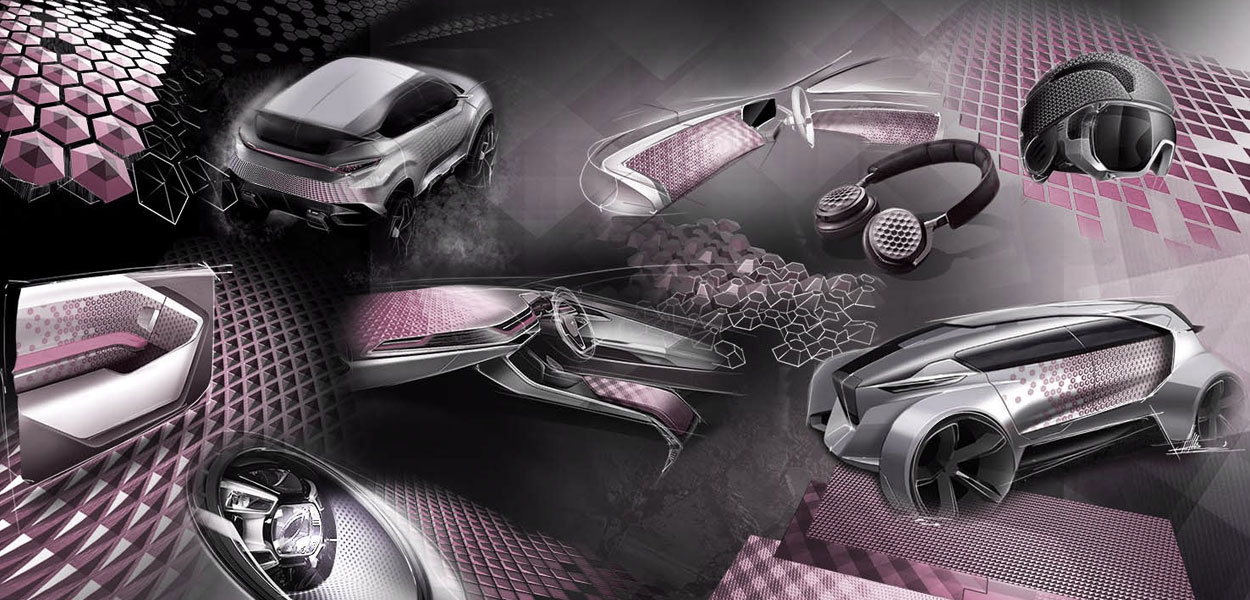
Advanced Design and R+D Centre
- Creative-technical consulting and development
Lasertexturing
- The alternative to conventional etching
Grain repair and gloss level adjustment
- Short-term support for your series production
High gloss polishing and contour restoration
- Highest quality in all quality levels
Laser-, CNC-engraving and milling
- Lettering, logos or complete contours
Laser- and TIG-welding
- The qualitative basis for any repair or modification
Repair of cast parts
- Sustainable repair of production-related defectives
Advanced Design and R+D Centre
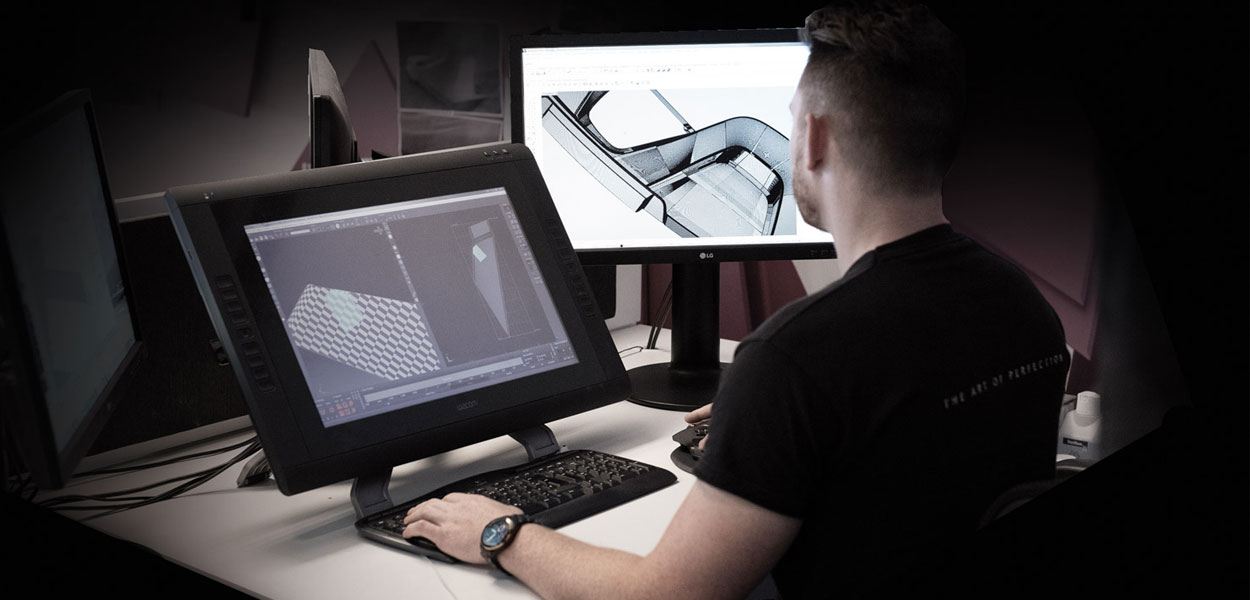
- In our in-house design and development centre, our highly qualified surface designers and developers advise you on products, design options and manufacturing processes. In addition, we develop holistic solutions to make you more competitive with your products and implement them technically at our premises.

Advantages
-
Rely on dymanic innovative power
and decades of know-how.We advise you comprehensively on the surfaces of your products and develop holistic concepts for them. In addition, we accompany your product from the initial idea to the first prototype to the finished end product.
- Design development
We advise you on design options for individual products or entire product families based on your product data. - Technical consulting
We develop manufacturing concepts, feasibility analyses or lighting concepts for your product and advise you on the selection of materials. - High-end visualisation
Thanks to state-of-the-art 3D rendering and mapping programmes as well as prototypes, you can already evaluate your product surfaces realistically during the coordination process.
Thanks to state-of-the-art 3D rendering and mapping programmes as well as prototypes, you can already evaluate your product surfaces realistically during the coordination process.
- Design development

Key facts
- With our numerous designers, we support you in holistic product and surface design. Rely on our extensive know-how and years of experience.
- Design freedom
- Global network
- High-end visualisation
- Concept development
- Prototyping
- Process support
- Quality improvement
- Texture development
- Texture reproduction
- Fully digital processes
- Workshops
Our services in the Advanced Design and R+D Centre
Workshops
- We regularly offer workshops on the topics of quality optimisation of grained plastic parts, cost reduction measures in the interior/exterior, design workshops and much more. These workshops can also be held at your premises with your entire team. Close coordination in advance is essential in order to meet your individual needs.
Concept development | Industrialisation
- Our multi-member development department creates different concepts on topics like cost reduction, paint removal, industrialisation, ambient lighting, matt and ultra-matt gloss levels and much more. To get a small insight into our different concepts, take a look at our news and innovations.
Design development and consulting
- We comprehensively advise you on the basis of your product data or sketches and develop inspiring surface concepts with you in our workshops for a single component or for an entire product family; everything completely individual according to your wishes.
Lighting development
- With our 30-person team, we also offer you light simulations, development, industrialisation, realisation and consulting. We design all optical systems only with structures that we can guarantee will be present on the later plastic product without any significant deviations. For this purpose, we exclusively use special laser technology, which reduces the deviation between simulation, prototype and series component to less than 5%. At the same time, we achieve new standards in terms of precision, optical sizes, light efficiency, light homogeneity and design.
Texture reproduction
- Our surface designers reproduce your existing grains in order to be able to insert them in an optimised form in a process-safe and fully digital way using a laser. From this point on, your grains are identical to the original and can be inserted into all injection moulds simultaneously and independently of each other in an absolutely reproducible manner - worldwide with identical quality and short processing times.
Texture development
- Our texture designers select suitable textures from our existing collection or develop completely new textures or texture families exclusively for you and your product. Our Advanced Design and R+D Centre will support you from the brainstorming stage through initial sketches/3D renderings, prototypes, material tests and parameter studies to the development of quality standardisation concepts and the elaboration of low-gloss or ultra-low-gloss concepts for your grain.
Mapping
- Through our mapping process, we can adapt textures that naturally warp on convex or concave freeform surfaces to your product, creating the highest level of visual aesthetics. This way, you can see your final product, including texture, at an early stage. We specialise in cross-component mapping and can thus map textures that pass from one component into another with homogeneous continuity.
High-end visualisation
- For the presentation of initial design ideas and concepts, we create high-resolution 3D renderings in almost photorealistic quality. Our renderings are calculated in a physically correct manner and depict an exact lighting representation or texture alignments and gradients. Due to the fully digital processes in connection with the modern technology of lasertexturing, all digitally represented details can also be incorporated into your series injection mould without deviation. This means that you receive high-resolution images of your series product at an early stage. We would be happy to inform you about our virtual reality options in a personal meeting.
Protoyping
- In order to provide you with physical visual samples, we can create prototype components on request, which are covered using a special film process. This allows us to display high gloss, fine structures, leather grains, geometric textures, texture runs and much more in an almost real level of detail.
Process support
- We also support you with our extensive know-how in your series- and approval-processes. Our scope of support ranges from injection moulding production to the approval process, independent defect analysis on plastic parts to optimisation measures and the preparation of independent expert opinions on component quality.
Lasertexturing
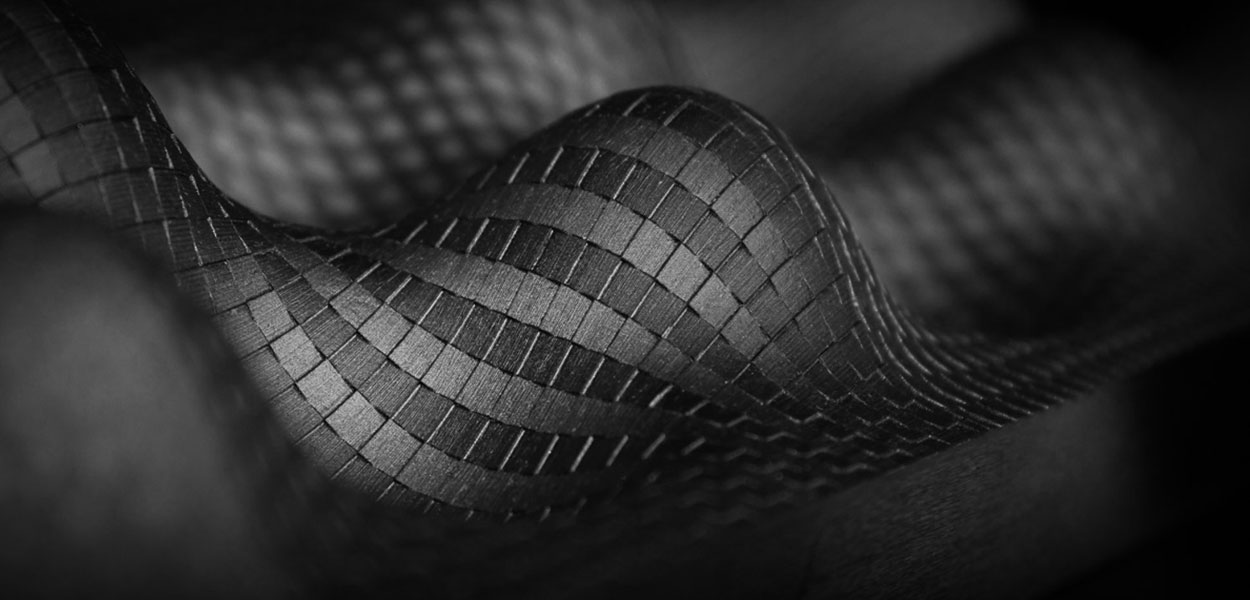
- As Europe's leading service provider in the field of lasertexturing and with more than 45 laser machines worldwide, we realise conventional etching, blasting and eroding structures as well as modern 3D design structures. Sustainable, reproducible, high-quality, fast and efficient.

Advantages
-
Worldwide reproducible laser textures. Fully digital and without manual work.
As a leading company in lasertexturing, we can apply grains of identical quality to your tools and moulds worldwide using the latest laser technology. There are no limits to your design ideas. Hundreds of grain approvals are also available for conventional etching grains from OEMs.- Matt gloss
We have specialised in the realisation of matt gloss levels in all plastics without exception. - Short processing times
Compared to the conventionally etched grain, we offer significantly shorter processing times. - Global network
Through cooperation partners in China, the USA, Canada and Portugal, we process your tools worldwide and identically.
- Matt gloss

Key facts
- As Europe's largest lasertexturing location, we set new standards in the processing of tools and moulds every day.
- Absolute process reliability
- Design freedom
- Highest precision
- Concept development
- Shortest processing times
- Matt gloss levels in all plastics
- Quality standardisation
- Quality improvement
Our services in the field of lasertexturing
Eroded structures and fine structures
- Eroding and fine structures can be lasered into your moulds or components with absolute reproducibility in accordance with the applicable standards (OEM specification or VDI3400). No complex electrodes are required, which is why lasertexturing is often more cost-effective and faster in processing. Furthermore, sharp lines to the high gloss can be guaranteed and, if necessary, engravings can be applied directly in one process.
Fade-Outs and Morphing
- To create excitement and unusual designs on plastic surfaces, so-called fade-outs or morphings can be used. In this process, the textures fade out in their depth from 100% to 0% or run into each other, so that completely new types of designs are created. As a result, the textures can change and begin in high-gloss surfaces, build up over 2D graphics and end in a matt 3D geometry.
Femto-Laser applications
- The world's most precise laser technology is Femto-laser technology (ultra-short pulse), which we have been using since 2020. This enables high-precision machining with radii of approx. 0.01 mm, sharp-edged and vertical geometries to be created or even tribological properties to be induced. This provides new possibilities such as holograms, colour effects in metal/plastic, engravings without depth, high surface qualities and much more, which are used depending on the application.
Functional structures
- With the help of laser technology, special structures for anti-glare, anti-reflection, anti-scratch, anti-slip, slip optimisation and much more can be introduced into your injection moulds or components. Due to significantly higher precision, completely new or better properties can be achieved compared to conventional processes such as eroding or etching.
Geometric 3D textures
- Thanks to our modern technology of lasertexturing, there are no more restrictions with regard to surface design and texture design. Highly complex 3D textures can be lasertextured - from carbon textures and detailed free designs to facets, polygons and geometrically complex sculptures. With precision of up to 0.001 mm and different laser sources, we realise any wishes and requirements.
Leather and textile grains
- Leather and textile grains can be applied in greater detail than before using the latest laser technology. Plastic parts can thus look as if they were laminated with leather, imitation leather, fabric, etc. Known grains can also be lasered into injection moulds absolutely reproducibly, quickly and efficiently. Even new surfaces such as leather-like materials, Alcantara, felts, etc. can be lasertextured with high-resolution digitalisation.
Lighting application
- Our laser technology paired with the extensive know-how of our employees in the lighting sector make completely new surfaces possible. We use it to lasertexture complete coupling-out or coupling-in optics, diffusers, design structures or light traps in front and rear lights or light guides. Here we set new standards in terms of design, energy efficiency and light homogeneity.
Grain repair and gloss level adjustment
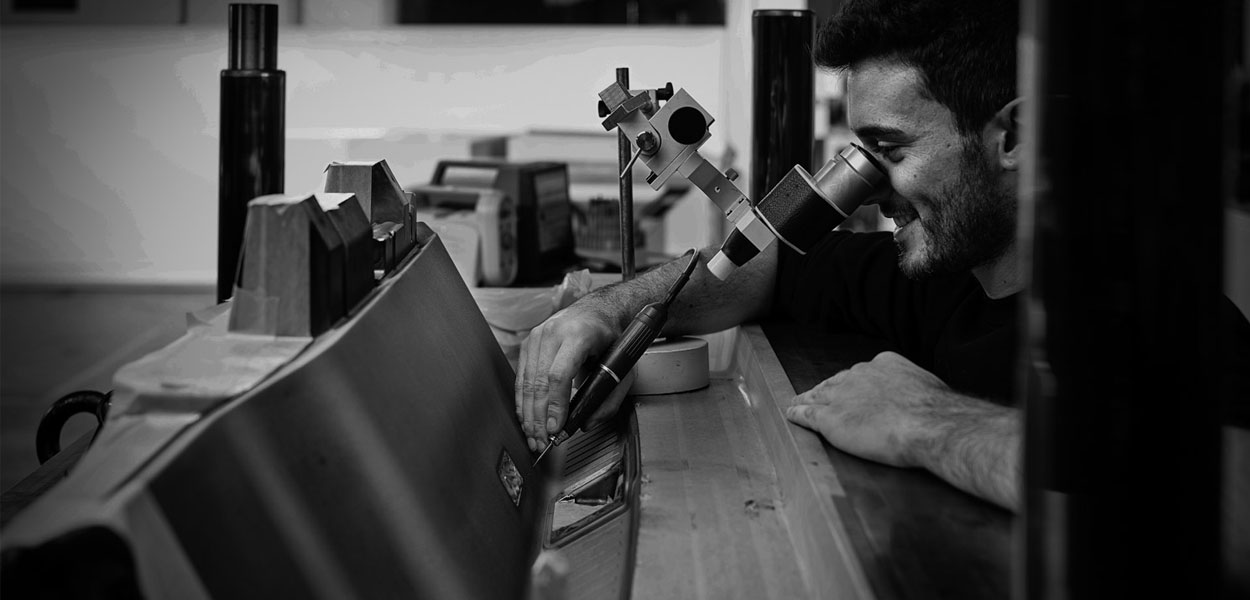
- As a specialist for surfaces, we repair grains of all types and manufacturers within the shortest possible time or adjust the gloss level of your injection mould using blasting technology. We carry out any necessary laser welding work ourselves.

Advantages
-
Any grain, any manufacturer, any process, any gloss level.
We will find a solution.
Every day, we repair around 15 etched, blasted, eroded or lasered injection moulds within a very short time and always find an individual solution for your component. Let us advise you extensively and generate perfect component surfaces. Depending on the application and the plastic granulate, gloss levels can be adjusted using both blasting and laser technology.- Exclusive in-house express service without advance notice
Enjoy a cup of coffee with us while your grain is being repaired. Compared to the conventionally etched grain, we offer significantly shorter processing times. - Europe-wide
on-site service
Our mobile teams travel all over Europe to your production site to repair your tools and moulds. - Holistic
service
centre
To reduce the processing time, we also take over all upstream and downstream machining processes of your tool.
- Exclusive in-house express service without advance notice

Key facts
-
- Shortest processing times
- Laser welding work can be carried out with us
- Mobile teams in action across Europe
- Repair of all grains and procedures
- Repair of competition grains
- Damage no longer visible
Our services in the area of grain repair and gloss level adjustment
Grain repair
- If grains or textures are damaged in the production process, we repair them quickly and to a high quality. We use both experienced employees for manual repairs and the latest laser technology. The determination of the right repair steps is based entirely on your individual application. However, you can be sure of one thing: The damage is no longer visible after the repair and is carried out within the shortest possible time. This shortens your production downtime to a minimum.
Gloss level adjustment
- When adjusting the gloss level, a specific microstructure is applied to the grain surface in the injection mould by means of special blasting materials (balls, corundum, etc.). The gloss level can be made more matt or glossy. It is often necessary after the initial sampling, as the gloss level on the component is strongly dependent on the injection moulding parameters. A 100% gloss level can also be set using the latest laser technology.
High gloss polishing and contour restoration
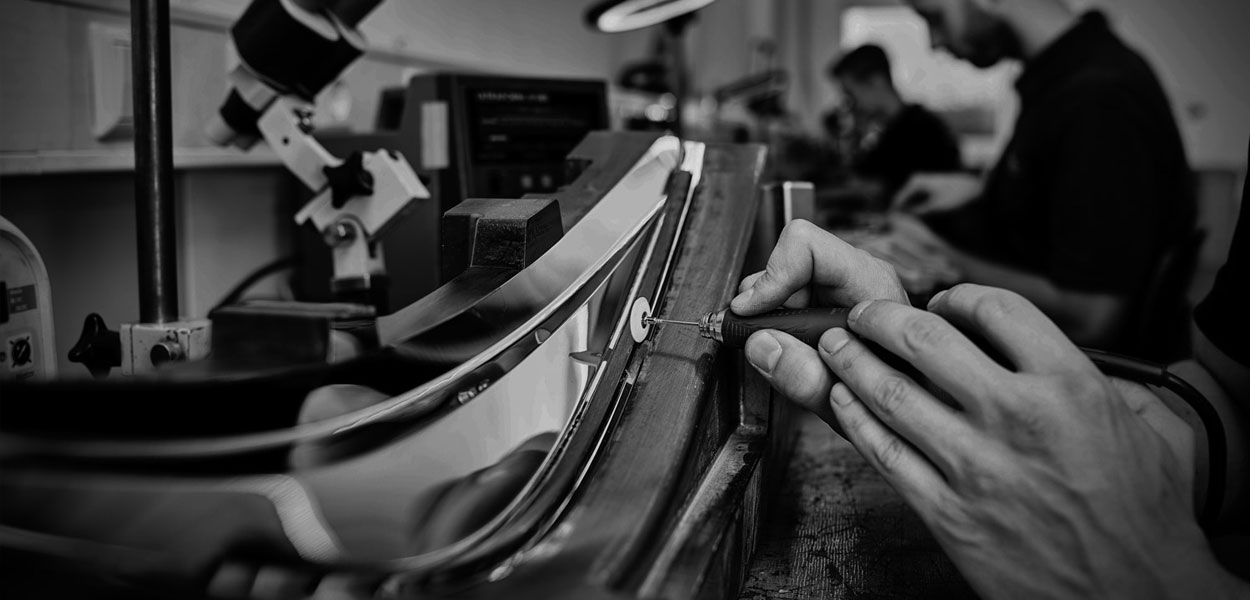
- We offer you contour restoration, grinding and polishing work from defined line grinding, grain preparation to absolutely technical high gloss in all tool sizes and application areas. Highest quality thanks to trained employees and state-of-the-art measuring methods are our focus.

Advantages
-
You can rely on our surface technicians.
With precision to perfection.
With more than 10 surface experts, we realise high-gloss polishes in every quality level and every degree of requirement and restore the contour after repairs to your tool.- Polishing in all quality levels
Starting from demoulding polishing, brush and gloss polishing up to high gloss polishing on optics or manufacting to dimensions in a tolerance range of 0.01 mm. - State-of-the-art measuring systems for quality assurance
We have numerous, highly accurate measuring systems to measure and document the polishing quality and dimensional accuracy after polishing. - Polishing to dimension
In order to ensure the lowest dimensional tolerances, e.g. in the medical sector, dimensional checks are carried out before and after the polishing work to maintain dimensional accuracy.
- Polishing in all quality levels

Key facts
- All services from one source
- Large capacities for maximum flexibility
- Extensive metallurgical expertise
- Complete repairs in the visible area
- Shortest processing times
- Custom polishing possible
Our services in the field of high gloss polishing and contour restoration
High-gloss polishing
- Our employees, who have decades of experience, polish injection moulds, individual/series parts and prototypes from all industries and applications to a brilliant high gloss. Dimensional accuracy, precision and an understanding of applications are of the utmost importance and thus even allow polishing in the headlight or medical sector.
Graining preparation
- Before surfaces can be lasertextured, grained or blasted, they must be prepared. In the process, milling offsets or unevenness are levelled so that a perfect surface quality is guaranteed. We know exactly which quality level is necessary for certain grains and can therefore ensure efficient processing while taking overall responsibility.
Contour restoration
- In the case of modifications or repairs, the contour must be restored true to drawing after welding. We can do this both with our precise Röders milling machines or manually by our surface specialists. Depending on the application and complexity, you will get the most efficient and fastest processing, without the need for reworking on your part.
Tool optimisation
- Our experienced toolmakers repair or optimise your injection mould in almost any matter. For years, we have specialised in the thin-wall and packaging area as well as repairs in the high-gloss and grain area. In addition to complete overhauls, this especially includes the optimisation and spotting of mould and slide separations in the A-view area. In order to be able to react flexibly and quickly to your requirements, all necessary service areas are located in our company. This means that no external partners are required.
Laser-, CNC-engraving and milling
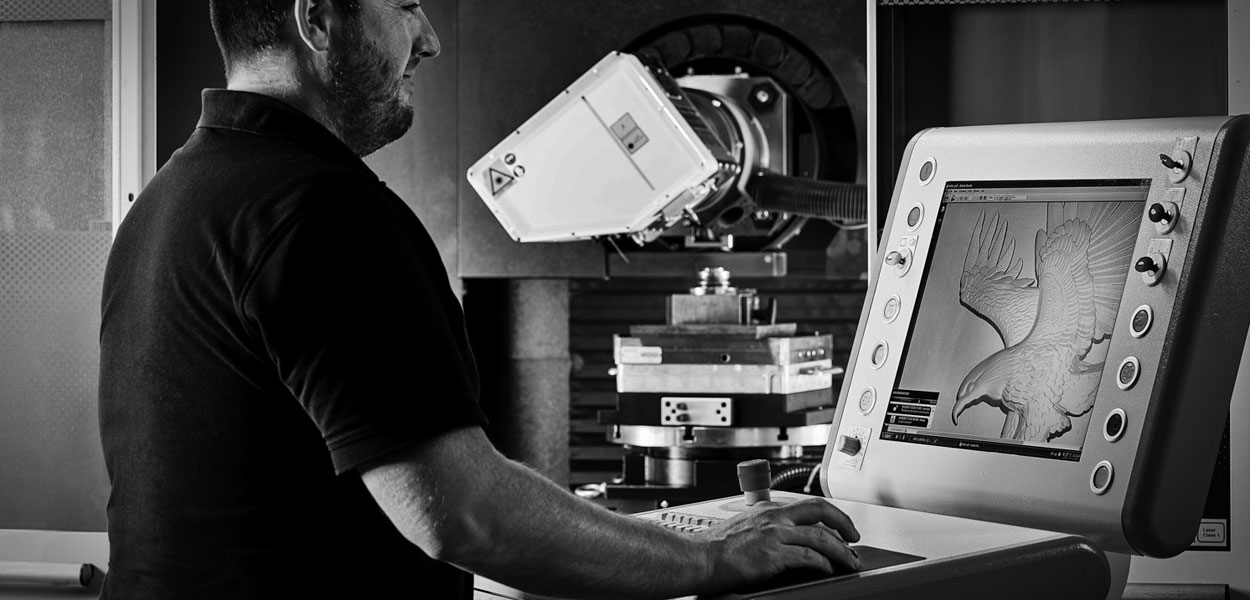
- Our origins in the engraving trade go back 40 years. Today, with a combination of state-of-the-art laser and milling machines, we offer you the full range of engraving services.

Advantages
-
Innovative by tradition for four decades.
Engraving 2.0.
Throughout Germany, we are regarded as one of the few but leading companies that innovatively deal with the engraving craft and use it industrially. Through years of experience, state-of-the-art machinery and traditional craftsmanship virtues, we continue to develop the craft and set new standards.- Innovation & Consulting
With our know-how and versatile technologies, we find the perfect solution for your individual requirements. - In-house express service and
24-hour deliveries
Thanks to decades of perfected work processes, we realise the shortest possible processing times. - Combination of different engraving technologies
We have a machine park with CNC engraving machines, laser engraving machines and HSC machining centres.
- Innovation & Consulting

Key facts
- Etching foils within 24 hours
- Germany's largest industrial engraving company
- Engraving in moulds up to 24 tons
- Engravings without burrs
- Highest precision through Femto laser technology
- No electrodes or similar necessary
- Shortest processing times
- Special engravings without depth
- In-house express service
Our services in the field of engraving and milling
Laser engravings
- With 4 4-axis and 13 5-axis laser systems, we are one of the largest engraving companies in Germany. Laser engravings are characterised by highly precise and absolutely reproducible results, through which inscriptions, letters, logos or even entire geometries can be produced in a wide variety of materials. Technically, there are hardly any limits here; even engravings without a flank angle, almost high-gloss in the base or a combination of engraving and texture in one process and much more are possible.
CNC engravings
- With 6 high-precision CNC engraving machines, deeper engravings, geometries or even entire components are produced. The deeper engravings are suitable for embossing stamps, electrodes, mould engravings and much more.
Milling
- In the case of modifications or repairs, milling is often necessary after the welding process. So that you can produce as quickly as possible, we rework the geometries directly by milling. We also carry out a large amount of carbide machining and have specialised in this area for many years
Signs
- We produce signs of all kind, in all quantities and sizes. These can be CNC engraved, laser engraved, printed in 4 colours or anodised. We mainly print the signs using a special process that is resistant to acids, abrasion, weathering and solvents. This makes these signs particularly suitable for highly stressed areas such as mould or tool signs, cooling circuits and much more.
Etching foils
- With our specially produced etching foils, you can add engravings such as date grids, functional inscriptions or material markings to the B-side of your tool yourself. We deliver the etching foil within 24 hours. We provide you with everything needed. This makes you highly flexible, saves you high transport costs and is unlimited in terms of mould size or weight.
Custom-made products
- Due to our high quality level, our creative design ideas and flexible manufacturing processes, we create and deliver complete components and assemblies from prototypes to individual small series. These include buttons, decorative parts, exclusive lettering, emblems and much more. There are no limits to your creativity. Together with our large partner network, we supply you with ready-to-install products worldwide. Contact us and talk to us about your possibilities.
Laser- and TIG-welding
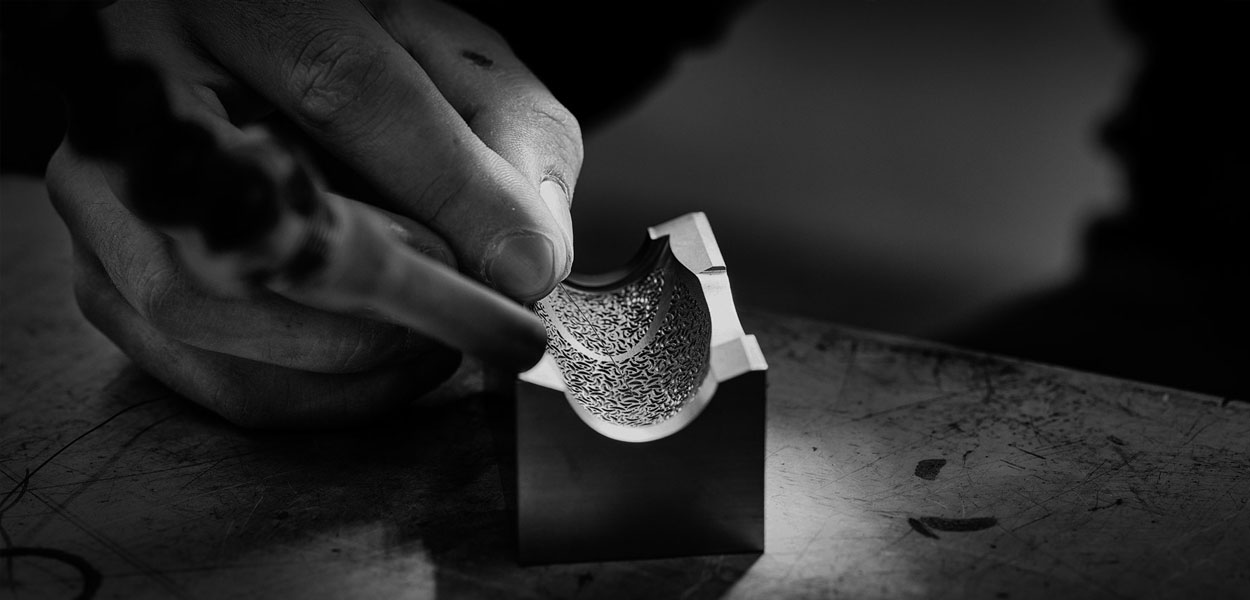
- When it comes to welding, you can rely on short processing times and high quality, including all downstream services.

Advantages
-
We are Germany's largest site for laser welding
with over 15 years of experience
With decades of experience in laser- and TIG-welding, more than 20 welding systems and trained metallurgists, we have the right solution for every application. We attach great importance to expert consulting and demonstrate a high level of understanding of manufacturing in order to be able to respond individually to your requirements. Our specialisation includes welding in high-gloss and grained surfaces. We not only weld on our premises, but also offer our services on your premises throughout Europe.- In-house express service without advance notice
Enjoy a cup of coffee with us while your components are being welded. - Holistic service centre
We are also happy to undertake contour restoration, milling, polishing, engraving or repair for you downstream. - Europe-wide
on-site service
Our mobile teams travel all over Europe to your production site to weld your tools and moulds.
- In-house express service without advance notice

Key facts
- 15 years of metallurgical know-how
- Tools weighing up to 20 tonnes can be welded
- Large capacities for maximum flexibility
- Cost-optimised combination welding with laser and TIG possible
- Mobile teams in action across Europe
- Over 20 welding machines with 300, 500 and 900 watts of power
Our services in the field of laser- and TIG-welding
Laser welding
- For 20 years, we have been using the laser welding process for filigree build-up welding in the repair and modification area for almost all materials and components. Thanks to special welding wires and the precise laser beam, very fine structural connections are created, which even allow invisible weldings in the high-gloss or grained area. We use the most modern laser systems with 300-900 watts of power and hand-guided to partially automated systems in order to be able to apply the correct and efficient processes for your specific application.
TIG welding
- We use the TIG welding process in particular for applications where large areas or volumes have to be applied. This process is suitable for efficient and fast processing. Compared to laser welding, significantly more material can be applied in the same time; however, it is far less filigree and less fine in its microstructure composition. The heat-affected zone is also much larger, which is why TIG welding cannot or must not be used in the high-gloss or grained areas.
Repair of cast parts
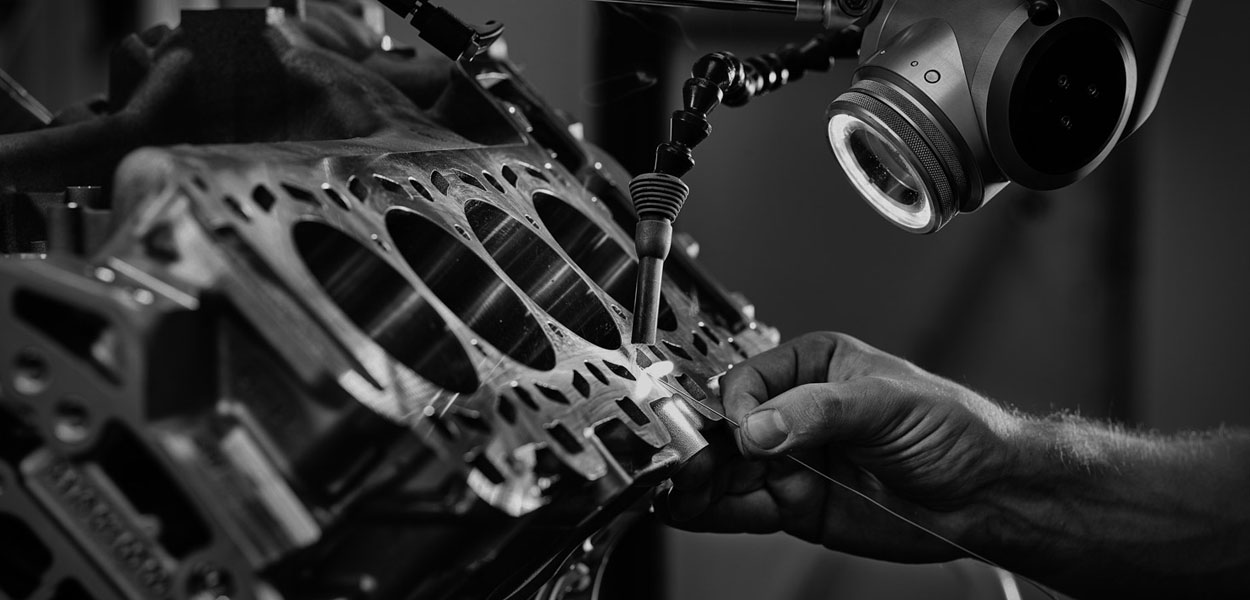
- Maintain your added value and significantly reduce your defective costs with us. We demonstrate the high quality of our repairs with more than 300,000 components every year. No mechanical reprocessing necessary.

Advantages
-
Reduce your defective costs and
increase your sustainability.
Our special laser welding process allows us to weld finished cast parts of all alloys without heat distortion. This allows us to create a long-lasting structural connection without any technical or optical disadvantages. No further mechanical processing on your part is necessary. You receive 100% ready-to-install, contour-true good parts back.- No heat distortion on the component
The laser process allows repairs to be carried out even in highly stressed areas. - Flexible capacities With over 300,000 repaired components per year and over 2,500 m² of production and storage space, we respond flexibly to your needs.
- No mechanical reprocessing necessary You will only receive good parts that are ready for series installation and conform to the drawing.
- No heat distortion on the component

Key facts
- Defective cast parts with pores, blowholes, cracks or leaks do not have to be remelted thanks to state-of-the-art laser welding technology.
- Europe-wide also on site
- Flexible capacities
- No heat distortion and all alloys weldable
- No mechanical reprocessing necessary
- Reduction of defective costs by up to 95%.
- You receive good parts ready for installation

Our services in the field of repair of cast parts
- We repair finished cast parts of all alloys. No further mechanical processing is necessary on your part. We deliver them back to you ready for installation and remain within all dimensional tolerances. Generally, we use a special laser welding process for the repair, which allows filigree material to be applied and enables precise reworking by our special surface technicians. Further services include sorting, commissioning, leak tests and much more.
INNOVATIONS
INNOVATIONS MADE BY REICHLE.

SUSTAINABLE PACKAGING RECYCLING WITH THE LATEST LASER TECHNOLOGY
-
In recent months, the Reichle Technology Centre and its partners FOBOHA and SPIES Packaging have been working intensively on making the packaging industry more efficient and sustainable. The idea of using invisible codes in packaging for this purpose was already highlighted in detail in 2016 as part of the HolyGrail initiative. The project, initiated by The Procter & Gamble Company, recognised the potential of digital watermarks early on and finally entered its second phase in 2020 to test the use of these codes for their economic viability and feasibility on an industrial scale.
Compared to traditional barcodes, digital watermarks allow information to be imprinted on the entire surface of the product. This information can provide more precise details about the product, its shelf life or its material composition. This enables the camera systems in plastic sorting systems to read this information and perform sorting much more accurately.

TAKE A LOOK AT OUR NEW ENGRAVING SAMPLE PLAQUE 2021
- Our new and latest engraving sample plaque shows different types of lasers (nanolaser, flexi-pulse laser and femtolaser), which can be used depending on the area of application and requirements. Specific advantages of the used laser technologies can be explained during a personal consultation. ?

COOPERATION PROJECT FOR THE CREATION OF FASCINATING AMBIENT LIGHTING
-
By combining the know-how of surface design, lighting and coating systems, we have succeeded in generating transillumination on 3D textured surfaces that is not visible in daylight and only becomes apparent when the light is switched on at night. This day-night design can be fully customised in terms of texture, illumination, colour and coating, thus allowing maximum design freedom - even in large-scale production. Transillumination can be offered as an optional extra and at the same time means no additional investment, as basic plastic parts form the basis of the design. In addition to a novel haptic and visual experience, the day-night design offers many other advantages and possibilities:
- Merging of decor, texture, coating and light without additional contour guides
- Partial transillumination on 3D textured surfaces
- Touch functions that can be integrated for a holistic HMI concept
- Further options such as anti-fingerprint and anti-microbial
- etc.

REICHLE TECHNOLOGIEZENTRUM X SIEVE - HOW SURFING CAN CHANGE THE OCEANS
-
When the Reichle Technologiezentrum became aware of the young start-up SIEVE a few months ago, no one could have guessed how much heart and soul and work on both sides would flow into this project in the weeks that followed. The small team around founder Sebastian Tettenborn has dedicated itself to its great passion, the oceans, by producing surf fins from recycled, locally processed plastic. As enthusiastic surfers, they experience first-hand how much the oceans suffer from the pollution caused by plastic waste and are now taking active steps against it with this project, at the same time campaigning for a more responsible approach to the use of plastics. Since the pollution of the environment has long ceased to be a secret, SIEVE's project and the urgency of their mission presented itself as the perfect opportunity for the Reichle Technologiezentrum to also contribute a small part to the solution themselves.
From the very beginning, the team at the Reichle Technologiezentrum has supported the development of the surf fins: from the initial brainstorming, through the creation of the designs, the technical implementation, the complete machining of the tools by milling, welding and polishing, to lasertexturing. The company even supported SIEVE in the production and made the in-house injection moulding machine in their development centre available for this purpose. The result are surf fins with a unique design that reflects both the organic and technical aspect of surfing, transitioning from a linen-like textile structure to a geometric polygon structure in a flowing transition. Since yesterday, the fins with their exciting design are available as Single Fin, Twin Fin and Thruster Fin on the SIEVE homepage. With the launch of the products, an enormously exciting time finally comes to an end, but not the cooperation with the start-up. In the future, the Reichle Technologiezentrum plans to continue supporting SIEVE in the production of the surf fins and looks forward to a great and successful cooperation.

THE REICHLE TECHNOLOGIEZENTRUM WINS THIS YEAR'S SPE AWARD IN THE OPTICS & ELECTRONICS CATEGORY
-
Every one and a half years, SPE Central Europe announces the Automotive Award for innovative plastic parts and components. An independent jury of experts from plastics technology, the automotive industry, recognised institutes and the trade press finally crowns the winners in various categories from all the entries. At this year's award ceremony, an innovative combination rearlight with unprecedented dimensions and efficient design left all competitors behind.
Together with the US automotive company Lucid Motors, which specialises in electric vehicles, the Reichle Technologiezentrum and lighting technology specialist Hella have developed this award-winning combination rearlight for the Lucid Air - a luxury electric vehicle with over 1,000 hp, a range of over 500 miles and therefore the most efficient electric drive in the world.

RECYCLING PROCESS OF PLASTIC PACKAGING WITH INVISIBLE CODING
-
Several million tonnes of plastic waste are generated in Germany every year. However, the recycling rate is far below the rate that can be achieved through efficient recycling processes. A major reason for the difficulty of recycling plastics is the often diverse material composition of different products, which makes it almost impossible to assign the individual plastic parts to a material category during the sorting process.
For this problem, the HolyGrail initiative was first launched in 2016 under the leadership of The Procter & Gamble Company, with the aim of developing solutions for sorting plastic packaging and promoting a sustainable circular economy. The follow-up project HolyGrail 2.0, launched in 2020, aims to introduce "invisible" digital watermarks into various plastic packaging and to design dedicated plastic sorting systems. In this second phase, an industrial test within the value chain was initiated to generate data on the feasibility of digital watermark technologies.
Compared to conventional barcodes, digital watermarks allow information to be displayed on the entire product surface. For this purpose, a pixel-based watermark is generated, which is applied to the product surface several times in a row during production. The watermark can contain not only information about the product, its durability and material composition, but also information about disposal and the recycling process that is visible to the end consumer.